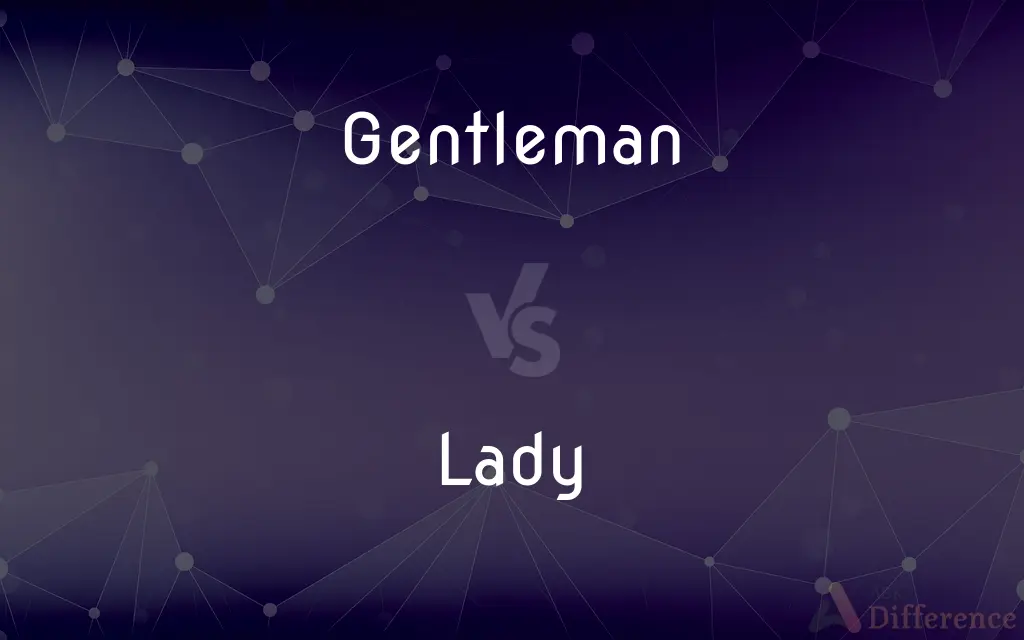Gentleman vs. Lady — What's the Difference?
By Urooj Arif & Maham Liaqat — Updated on March 27, 2024
A gentleman is traditionally a man of good social position, especially one of wealth and leisure, while a lady is a woman of similar status or manners.

Difference Between Gentleman and Lady
Table of Contents
ADVERTISEMENT
Key Differences
Gentleman, historically associated with men of high social rank or gentlemanly behavior, implies courteous conduct and chivalrous qualities. Ladies, on the other hand, denote women of refinement and polite manners, often linked with nobility or social distinction. While both terms carry connotations of respect and decorum, they cater to gender-specific roles defined by societal standards.
The term "gentleman" has evolved to encompass broader meanings beyond social rank, focusing on behavior and conduct. A gentleman is now often defined by his actions, respect for others, and moral integrity. Whereas, "lady" still retains a strong association with social grace and courtesy, but similarly, it emphasizes behavior and treatment towards others.
In professional or formal settings, "gentleman" and "lady" are used to address individuals with a tone of respect. While both terms serve similar functions in elevating the level of discourse, they are differentiated by the gender of the individuals they describe.
Culturally, the expectations from a gentleman versus a lady can vary significantly, reflecting traditional gender roles. Gentlemen are often expected to exhibit strength, protection, and leadership qualities, whereas ladies are traditionally associated with nurturing, grace, and compassion.
Despite these distinctions, modern interpretations of "gentleman" and "lady" advocate for qualities like respect, kindness, and integrity, which transcend traditional gender roles. The emphasis is increasingly on the character and behavior that define a person as well-mannered and respectful, irrespective of their gender.
ADVERTISEMENT
Comparison Chart
Traditional Meaning
A man of good social position and manners.
A woman of good social position and manners.
Behavioral Expectations
Courteous, respectful, chivalrous.
Graceful, polite, nurturing.
Social Connotation
Associated with nobility and moral integrity.
Linked with grace, compassion, and refinement.
Modern Interpretation
Focus on behavior and respect towards others.
Emphasis on social grace and courteous behavior.
Gender Role
Reflects traditional male roles of leadership and protection.
Reflects traditional female roles of nurturing and compassion.
Compare with Definitions
Gentleman
A man of noble or gentle birth.
He was recognized as a gentleman by virtue of his family lineage.
Lady
A woman of noble or gentle birth.
She was born a lady, with an aristocratic heritage.
Gentleman
Someone who behaves in a polite and considerate manner.
He proved himself a true gentleman when he offered his seat to the elderly lady.
Lady
A female individual who maintains a high standard of conduct in her professional life.
In the boardroom, she was not just a leader but a lady, always composed and respectful.
Gentleman
A man displaying courteous behavior, especially towards women.
The gentleman opened the door for his partner, showcasing his chivalrous nature.
Lady
A woman who treats people with kindness and consideration.
As a lady, she made sure to thank everyone for their service.
Gentleman
A male individual who conducts himself with decency and integrity in a professional setting.
He was a gentleman in negotiations, always fair and honest.
Lady
A woman who exhibits grace and refinement in her demeanor.
The lady carried herself with an elegance that was admired by all.
Gentleman
A man who treats others with respect and dignity.
As a gentleman, he always listened attentively and spoke kindly.
Lady
A woman who conducts herself with dignity and politeness.
She was always a lady, gracious and kind to everyone she met.
Gentleman
A gentleman (Old French: gentilz hom, gentle + man) is any man of good and courteous conduct. Originally, gentleman was the lowest rank of the landed gentry of England, ranking below an esquire and above a yeoman; by definition, the rank of gentleman comprised the younger sons of the younger sons of peers, and the younger sons of a baronet, a knight, and an esquire, in perpetual succession.
Lady
A woman of high social standing or refinement, especially when viewed as dignified or well-mannered.
Gentleman
A man of gentle or noble birth or superior social position
"He's too much a gentleman to be a scholar" (Aphra Behn).
Lady
A woman who is the head of a household
Is the lady of the house at home?.
Gentleman
A well-mannered and considerate man with high standards of proper behavior. See Usage Note at lady.
Lady
A woman, especially when spoken of or to in a polite way
Ladies, may I show you to your table?.
Gentleman
A man of independent means who does not need to have a wage-paying job.
Lady
Used as a form of address for a woman, often with sarcasm or irritation
Look, lady, I was ahead of you in line.
Gentleman
A man
Do you know this gentleman?.
Lady
A woman who is the object of romantic or chivalrous love
A knight serving his lady.
Gentleman
Gentlemen (-mən) Used as a form of address for a group of men.
Lady
(Informal) A wife or girlfriend
A man kissing his lady at the airport.
Gentleman
A manservant; a valet.
Lady
A lady in waiting
The queen and her ladies.
Gentleman
A man of gentle but not noble birth, particularly a man of means (originally ownership of property) who does not work for a living but has no official status in a peerage; an armiferous man ranking below a knight.
Being a gentleman, Robert was entitled to shove other commoners into the gongpit but he still had to jump out of the way of the knights to avoid the same fate himself.
Lady
A general feminine title of nobility and other rank, specifically as the title for the wife or widow of a knight or baronet.
Gentleman
Any well-bred, well-mannered, or charming man.
Lady
Used as a form of address for a woman of high rank, especially for a marchioness, countess, viscountess, baroness, or baronetess.
Gentleman
An effeminate or oversophisticated man.
Well, la-di-da, aren't you just a proper gentleman?
Lady
Lady The Virgin Mary. Usually used with Our.
Gentleman
Any man.
Please escort this gentleman to the gentlemen's room.
Lady
(historical) The mistress of a household.
Gentleman
An amateur or dabbler in any field, particularly those of independent means.
Lady
A woman of breeding or higher class, a woman of authority.
"I would like the dining room to be fully set by tonight; would you do so?" "Yes, my lady".
Gentleman
(cricket) An amateur player, particularly one whose wealth permits him to forego payment.
Lady
The feminine of lord.
Gentleman
A man well born; one of good family; one above the condition of a yeoman.
Lady
A title for someone married to a lord or gentleman.
Gentleman
One of gentle or refined manners; a well-bred man.
Lady
A title that can be used instead of the formal terms of marchioness, countess, viscountess, or baroness.
Gentleman
One who bears arms, but has no title.
Lady
(in the plural) A polite reference or form of address to women.
Ladies and gentlemen, it is a pleasure to be here today. Follow me, ladies!
Gentleman
The servant of a man of rank.
The count's gentleman, one Cesario.
Lady
(slang) Used to address a female.
Hey, lady, move your car!
Hey, ladies, how are you doing?
Gentleman
A man, irrespective of condition; - used esp. in the plural (= citizens; people), in addressing men in popular assemblies, etc.
Lady
(ladies' or ladies) Toilets intended for use by women.
Gentleman
A man of refinement
Lady
(informal) A wife or girlfriend; a sweetheart.
Gentleman
A manservant who acts as a personal attendant to his employer;
Jeeves was Bertie Wooster's man
Lady
A woman to whom the particular homage of a knight was paid; a woman to whom one is devoted or bound.
Lady
(slang) A queen the playing card.
Lady
Who is a woman.
A lady doctor.
Lady
(Wicca) Lady.
Lady
(archaic) gastric mill, the triturating apparatus in the stomach of a lobster, consisting of calcareous plates; so called from a fancied resemblance to a seated female figure.
Lady
A five-pound note. (Rhyming slang, Lady Godiva for fiver.)
Lady
A queen.
Lady
To address as “lady”.
Lady
A woman who looks after the domestic affairs of a family; a mistress; the female head of a household.
Agar, the handmaiden of Sara, whence comest thou, and whither goest thou? The which answered, Fro the face of Sara my lady.
Lady
A woman having proprietary rights or authority; mistress; - a feminine correlative of lord.
Of all these bounds, even from this line to this, . . . We make thee lady.
Lady
A woman to whom the particular homage of a knight was paid; a woman to whom one is devoted or bound; a sweetheart.
The soldier here his wasted store supplies,And takes new valor from his lady's eyes.
Lady
A woman of social distinction or position. In England, a title prefixed to the name of any woman whose husband is not of lower rank than a baron, or whose father was a nobleman not lower than an earl. The wife of a baronet or knight has the title of Lady by courtesy, but not by right.
Lady
A woman of refined or gentle manners; a well-bred woman; - the feminine correlative of gentleman.
Lady
A wife; - not now in approved usage.
Lady
Any woman; as, a lounge for ladies; a cleaning lady; also used in combination; as, saleslady.
Lady
The triturating apparatus in the stomach of a lobster; - so called from a fancied resemblance to a seated female figure. It consists of calcareous plates.
Lady
Belonging or becoming to a lady; ladylike.
Lady
A polite name for any woman;
A nice lady at the library helped me
Lady
A woman of refinement;
A chauffeur opened the door of the limousine for the grand lady
Lady
A woman of the peerage in Britain
Common Curiosities
Do the terms 'gentleman' and 'lady' imply certain social responsibilities?
Yes, both terms carry expectations of upholding high standards of behavior, respect towards others, and acting as role models in society.
What defines a gentleman in modern society?
In modern society, a gentleman is defined by his respectful, considerate behavior, and moral integrity, rather than his social rank.
Is it outdated to use the terms 'gentleman' and 'lady'?
While some consider these terms traditional, they remain relevant in contexts emphasizing respect, politeness, and dignity.
Is there a modern equivalent to 'gentleman' and 'lady'?
Modern equivalents focus more on being a 'respectful person' or 'person of integrity,' emphasizing character over gender-specific titles.
Can anyone be considered a lady based on behavior alone?
Yes, being a lady is more about conduct, grace, and manners than about birth or social standing.
How are the roles of gentlemen and ladies evolving?
The roles are evolving to focus more on personal character and behavior rather than traditional gender roles and social status.
Are the concepts of 'gentleman' and 'lady' limited to Western cultures?
While originating in Western culture, the concepts have global relevance in promoting respect, courtesy, and dignity across different societies.
Can the terms 'gentleman' and 'lady' apply to young people?
Yes, these terms can be applied to young people who exhibit qualities of respect, politeness, and maturity beyond their years.
Can the terms 'gentleman' and 'lady' be empowering?
Yes, when used to recognize and appreciate respectful and dignified behavior, these terms can be empowering and affirming.
How do 'gentleman' and 'lady' relate to professional environments?
In professional settings, being a gentleman or lady refers to conducting oneself with integrity, respect, and professionalism, regardless of gender.
How can one teach children to embody the qualities of a gentleman or lady?
Teaching by example, emphasizing respect, kindness, and good manners, and reinforcing the importance of treating others with dignity can instill these qualities.
Do 'gentleman' and 'lady' have different connotations in different languages or cultures?
Yes, the interpretation and emphasis of these terms can vary significantly across languages and cultures, reflecting local values and social norms.
Are there any contemporary criticisms of using 'gentleman' and 'lady'?
Critics argue that these terms can perpetuate outdated gender roles and expectations, advocating for more inclusive language that emphasizes respect for all individuals.
How do 'gentleman' and 'lady' compare to 'sir' and 'madam'?
'Sir' and 'madam' are formal titles used in direct address, often in service contexts, while 'gentleman' and 'lady' describe broader behavior and social standing.
In the age of gender fluidity, how are the concepts of 'gentleman' and 'lady' evolving?
The concepts are becoming more inclusive and focused on behavior and character rather than strictly defined gender roles, embracing respect and dignity for everyone.
Share Your Discovery

Previous Comparison
Philosopher vs. Philosophizer
Next Comparison
Werewolf vs. WolfmanAuthor Spotlight
Written by
Urooj ArifUrooj is a skilled content writer at Ask Difference, known for her exceptional ability to simplify complex topics into engaging and informative content. With a passion for research and a flair for clear, concise writing, she consistently delivers articles that resonate with our diverse audience.
Co-written by
Maham Liaqat














































